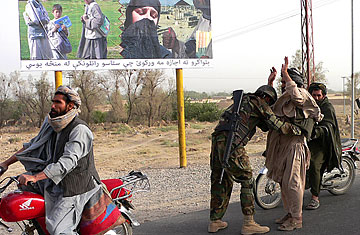
A member of the Afghan national army searches passengers at a checkpoint in the Arghandab district near Kandahar on June 17
(2 of 2)
But more troops will be of little use if Afghan insurgents are finding support and sanctuary across the border in Pakistan. McNeil, who spent 16 months in Afghanistan and left on June 3, blamed April's 50% increase in attacks on coalition troops in Afghanistan's east and south on insurgents crossing the border from Pakistan. Despite "tactical success on the battlefield last year, we still have a lot of work to do," he told journalists just before departing the country. "As long as there are these sanctuaries that remain out of the reach of security forces here, long-term security and stability will be difficult to fully achieve."
Pakistan, which once supported the Taliban government in Afghanistan, is now suffering an insurgency of its own. Militants aligned with al-Qaeda have not only attacked security forces in the ungoverned tribal areas; they have also sent suicide bombers to major urban areas such as Lahore, Karachi and Islamabad. The Pakistani army has been unable to contain the militants, and has already lost around 1,000 soldiers trying. In an attempt to gain stability, the military embarked last December on peace negotiations with militant groups. The newly elected government in Islamabad is backing the talks, and militants have agreed to stop attacking government institutions in exchange for the army pulling forces out of the tribal areas. But just a few weeks after news of the negotiations broke, Baitullah Mehsud, head of an umbrella group of insurgents called Tehrik-e-Taliban Pakistan, declared at a press conference that he would continue his jihad against foreign forces fighting in Afghanistan.
Useful Friends
A new study released by the rand corporation and funded by the U.S. Defense Department claims that Pakistani intelligence agents and paramilitary forces have helped train Taliban insurgents, and have given them information about American troop movements in Afghanistan. "Every successful insurgency in Afghanistan since 1979 enjoyed safe haven in neighboring countries, and the current insurgency is no different," said the report's author, Seth Jones. "Right now, the Taliban and other groups are getting help from individuals within Pakistan's government, and until that ends, the region's long-term security is in jeopardy." The Pakistani military has rejected the report, calling it "rubbish."
During the civil war that followed the Soviet withdrawal from Afghanistan in 1989, Pakistan backed the Taliban by offering training, funding and weapons. In 2001 President General Pervez Musharraf severed the ties, but many observers believe that some elements within the military have retained links, either for ideological reasons or in order to keep control over their neighbor. "I do not believe it is centrally directed or accepted," says a Western military official in Pakistan who was not authorized to speak on the record, "but I do believe there are individuals at the lower field levels who are maintaining ties with extremists, Taliban and maybe even al-Qaeda."
Afghanistan's President Hamid Karzai has said he is fed up with Taliban militants using Pakistan as a sanctuary, announcing in a press conference on June 15 that he would send Afghan troops into Pakistan to hunt down Taliban leaders. "Afghanistan has a right to self-defense," Karzai said. Pakistani officials reacted angrily, swearing to defend their territorial sovereignty. Relations between the two countries have always been fragile; Karzai's statement strained them further. But instead of being chastised for his lack of diplomacy, Karzai received the blessing of U.S. President George Bush: "Our strategy is to deny safe haven to extremists who would do harm to innocent people," Bush said. "That's the strategy of Afghanistan; it needs to be the strategy of Pakistan."
—With reporting by Ali Safi/Bamiyan